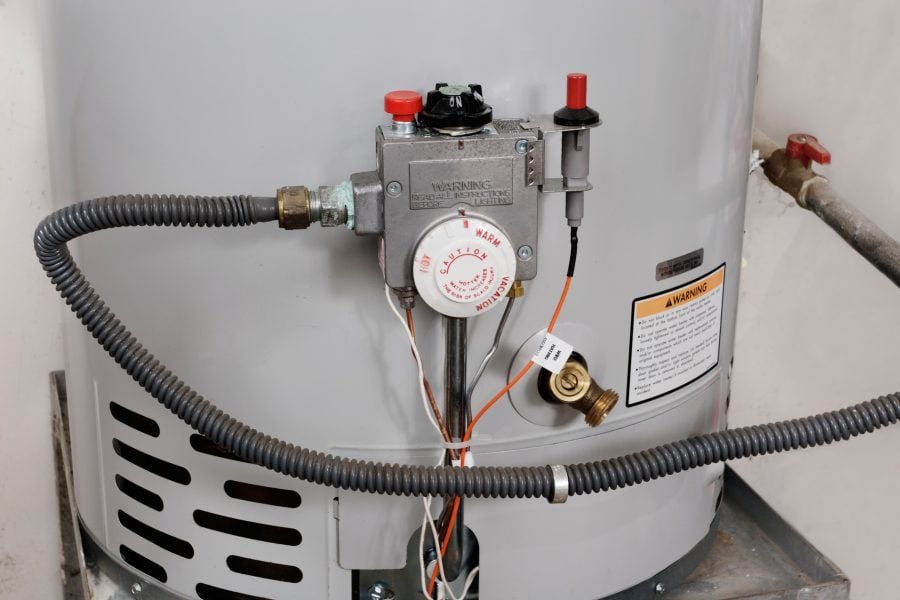Nobody Likes An Accidental Cold Shower
Most of us have experienced a time when in the middle of a hot shower, a rush of cold water hits out of nowhere and instantly wakes you up. The device that manages the supply of hot water coming through your shower head is called a water heater. Once-in-a-while instances where your hot shower is interrupted with cold water is OK, but constant problems with varying water temps or just straight cold water when it’s supposed to be hot is a sign that your water heater is on the fritz. That’s why choosing the right type of water heater is important.
There are two major types of water heaters: tank-type water heaters and tankless water heaters.
How Tank-type Water Heaters Work
Tank-type water heaters increase the temperature of your water supply by two modalities: electricity or fuel. Fuel-powered water heaters are either powered by natural gas, propane, or oil. Natural gas water heaters are by far the most popular. However, oil-based water heaters are also used in certain geographical areas.
There are three primary roles of a tank-type water heater:
- Heat up the water
- Store the heated water until it is ready to use while maintaining temperature
- Vent out any potential by-products like exhaust gases from natural gas units
How Tankless Water Heaters Work
Tankless water heaters eliminate the need to store and insulate water in a steel tank by instead heating water “on-the-fly.” This is why sometimes tankless water heaters are called demand water heaters or instantaneous water heaters. These setups only provide hot water when it is needed.
In a tankless water heater setup, cold water flows through a heating element in the unit (typically a coil pipe). Whenever a hot water source is turned on, the cold water flows through the heating element, and it heated instantaneously by either gas or electricity. When the hot water tap is turned off, the cold water ceases to flow through the heating element, and the hot water stops flowing.
Tank-Type vs. Tankless Water Heaters: Pros and Cons
Because of the functional differences between tank-type and tankless water heaters, there are pros and cons of using each type of water heater. From a usage perspective, tankless water heaters can be more reliable when it comes to delivering a steady hot water temperature because the supply of water that flows through the heating element is constant.
On the other hand, tank-type water heaters typically have higher flow rates than tank-type water heaters. This is because the heating element in a tankless water heater system limits the flow to the tap. In a tank-type water heater system, water freely flows from the tank to the tap without needing to flow through a heater, resulting in better flow rates.
Adding parallel or separate tankless water heaters can help increase flow efficiency. However, this can also add to your upfront costs as well.
Cost & Energy Savings of Tank-Type & Tankless Water Heaters
From a cost and energy savings perspective, homeowners who use 41 gallons or less of hot water daily will typically benefit the most from tankless water heaters. Since tankless water heaters don’t have to heat and maintain the temperature of a large tank of water, energy usage and thus energy costs are lower.
Tankless water heaters can also be installed at each water outlet, which can reap even greater energy savings benefits.
Even though tankless water heaters can save money in the long run, the up-front costs of installing a tankless water heater are generally higher. Depending on your system’s design, however, these costs can be potentially offset by the long-term savings. It is recommended that you contact your local plumber for assistance in implementing a water heater system – especially if your number one priority is energy efficiency and cost savings.
Installation, Repair, and Maintenance of Water Heaters
Tank-type water heaters are generally easier to install. On the other hand, tankless water heaters are known to last longer than tank-type water heaters. Tankless water heater parts are can also be relatively cheaper than their storage tank counterparts.
One special consideration in the installation of tankless systems is whether the previous system was tank-type or not. Installation costs of a tankless water heater in a home or business that was previously using a tank-type water heater will be higher. This is because your local plumbing contractor will need to retrofit the system to make the tankless water heater work.
So is a Storage Water Heater or Demand Water Heater Right For Me?
The best person to help you make that judgment is an experienced plumbing contractor. Despite this, you can use the following guidelines to help you decide which water heater to buy if your system goes south.
- If long term savings is your top priority, go with a tankless water heater because the long-term savings can balance out the higher upfront costs.
- If you’re short on cash right now, go with a traditional tank-type water heater because the up-front installation costs are usually lower.
- If energy savings is your top priority, go with a tankless water heater because the tankless design eliminates the need to continuously work to keep your water supply heated.
- If you use less than 40-50 gallons of hot water daily, go with a tankless water heater as you won’t be affected by the limited flow rates as much.
- If you use more than 40-50 gallons of hot water daily or use appliances in your home that use a lot of hot water simultaneously, go with a tank-type water heater as these water heaters have higher flow rates. Just make sure you buy the appropriate-sized system.
Still Not Sure Which One Is Best?
Give us a call here at WaterWork Plumbing at 248-542-8022 or contact us today to have one of our plumbing experts help you decide.


